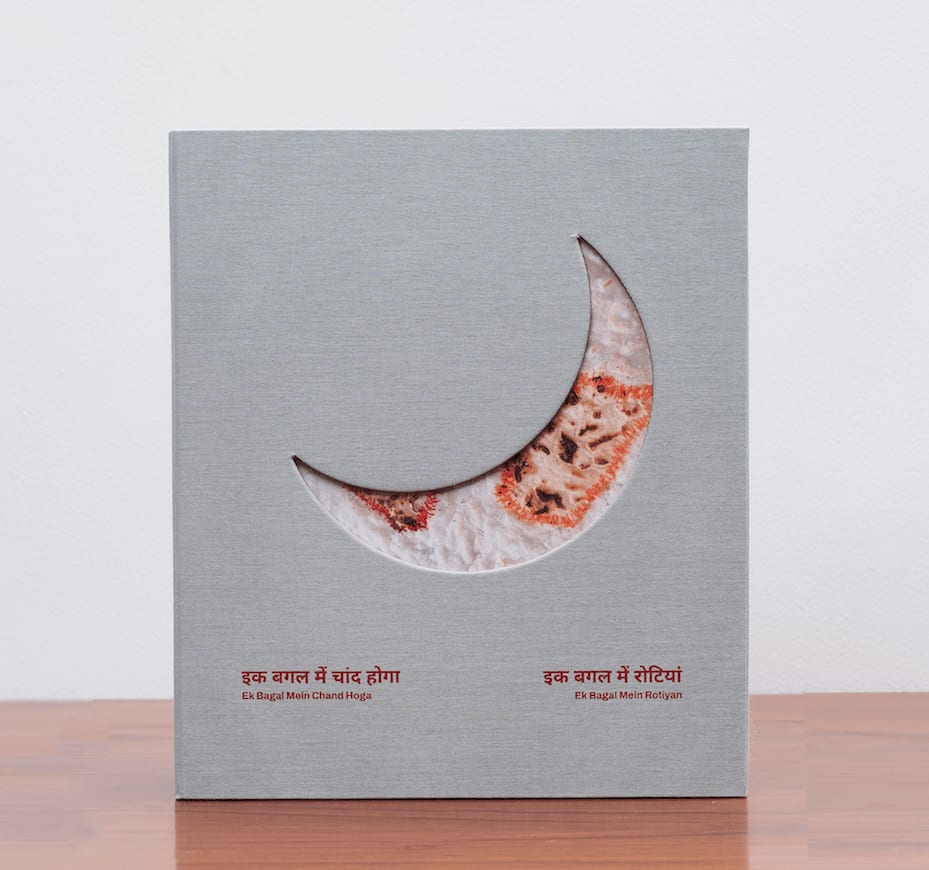Parag Tandel b. 1978
Ek Bagal Mein Chand Hoga Ek Bagal Mein Rotiyan, 2022
Artist Book
(HSN Code: 970110)
(HSN Code: 970110)
9.3 x 10.8 x 3 in
Edition of 25
Copyright Parag Tandel 2022
Parag Tandel’s work is influenced by the changing seascape of Mumbai, an environment that is essential to him as an artist as well as as a member of the Koli...
Parag Tandel’s work is influenced by the changing seascape of Mumbai, an environment that is essential to him as an artist as well as as a member of the Koli community, one of Mumbai’s original communities. Driven by a desire to reverse the sense of loss of indigenous resources, trade, and ecosystems Tandel, alongside the women of the Chendani fishing village, has developed this manuscript of Dry Seafood recipes containing narratives of loss and changing occupations. For Tandel, these recipes embody myths buried in the corners of our collective memory.
"Rapid urbanisation of the post-MIDC era had an immense detrimental impact on Mumbai’s fishing industry. New labour policies forced those engaged in traditional occupations to work in factories, and the affluents from these industrial plants was released into the ocean, contaminating the habitats of local fish. Many women who earned their livelihoods from drying and selling fish were left without a form of sustenance, and had to take up the production of rice-flour rotis instead. As a result of these changes, many recipes, especially those that contained the Koli staple of dried fish are being lost. Spurred by this loss, Tandel and Kadambari Koli-Tandel, organised a food-centric gathering, an archival ‘hackathon’, to collate recipes with women from Chendani Koliwada. In the process, with the participation of community elders, a few recipes that had been lost from popular circulation were revived and inscribed. Alongside these recipes, we see drawings by the artist mapping the techniques, motifs, and shifts in the culture of drying fish. Tandel relates expounds the the act of drying, sometimes as loss and destruction, but other times as an important form of preservation. Tandel looks to enact this expanded sense of preservation to the Koli language, slowly dying out. In following oraliture that claims the process of mummification was inspired from traditions of drying fish, the artist combines the mummification of the popular fish, bombayduck -itself in danger of extinction- with songs in a dialect of Koli bhasha, both originally prepared by women from the Colaba Koliwada during a performance. This tender time capsule is contained in cases that protect them in their onward journey to future generations."
Shaunak Mahbubani, curator Archipelagic Archivist, 2023
"Rapid urbanisation of the post-MIDC era had an immense detrimental impact on Mumbai’s fishing industry. New labour policies forced those engaged in traditional occupations to work in factories, and the affluents from these industrial plants was released into the ocean, contaminating the habitats of local fish. Many women who earned their livelihoods from drying and selling fish were left without a form of sustenance, and had to take up the production of rice-flour rotis instead. As a result of these changes, many recipes, especially those that contained the Koli staple of dried fish are being lost. Spurred by this loss, Tandel and Kadambari Koli-Tandel, organised a food-centric gathering, an archival ‘hackathon’, to collate recipes with women from Chendani Koliwada. In the process, with the participation of community elders, a few recipes that had been lost from popular circulation were revived and inscribed. Alongside these recipes, we see drawings by the artist mapping the techniques, motifs, and shifts in the culture of drying fish. Tandel relates expounds the the act of drying, sometimes as loss and destruction, but other times as an important form of preservation. Tandel looks to enact this expanded sense of preservation to the Koli language, slowly dying out. In following oraliture that claims the process of mummification was inspired from traditions of drying fish, the artist combines the mummification of the popular fish, bombayduck -itself in danger of extinction- with songs in a dialect of Koli bhasha, both originally prepared by women from the Colaba Koliwada during a performance. This tender time capsule is contained in cases that protect them in their onward journey to future generations."
Shaunak Mahbubani, curator Archipelagic Archivist, 2023
Exhibitions
India Art Fair 2022Literature
Midday, Chronicling the Kolis, May 12, 2022https://www.tarq.in/press/302-chronicling-the-kolis/
Homegrown, Attend A Mumbai Exhibition Celebrating The City's Maritime Legacy And The Koli Community, Aug 18, 2023
https://homegrown.co.in/homegrown-explore/attend-a-mumbai-exhibition-celebrating-the-citys-maritime-legacy-and-the-koli-community
